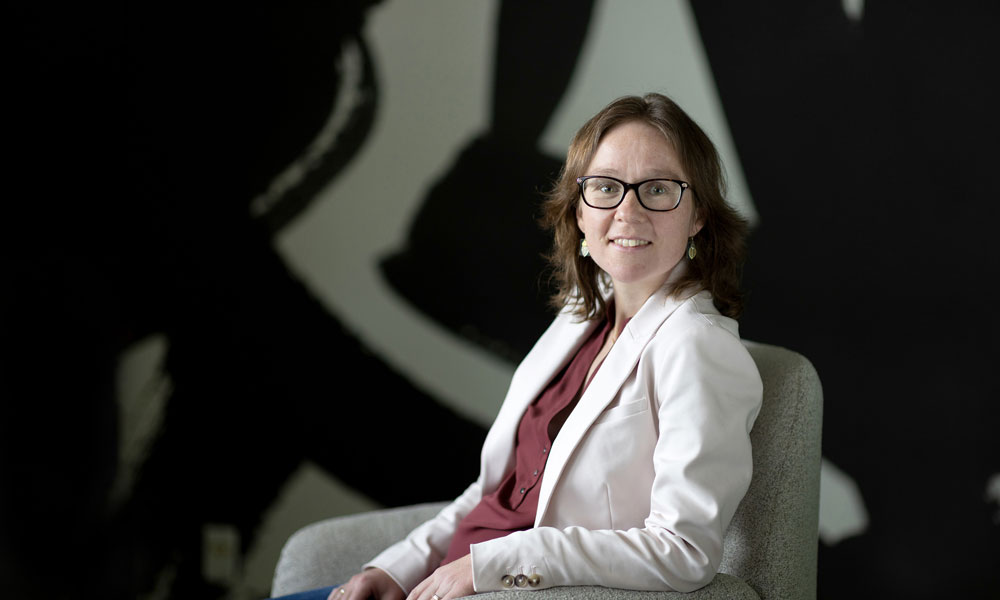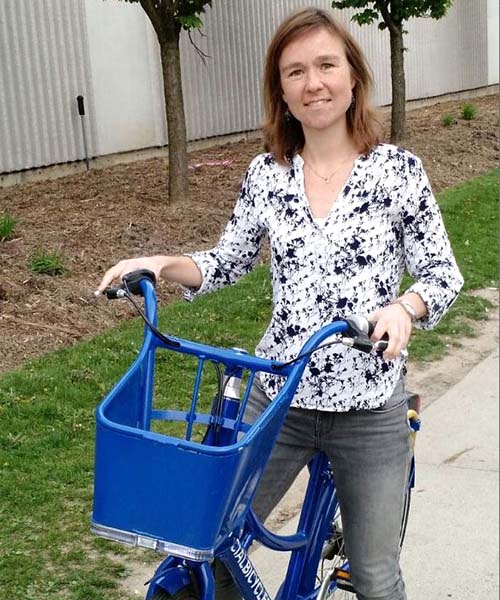Community Engagement, Global Engagement, Health, People, Research
Dr. Femke Hoekstra collaborates across the continents
January 24, 2022

About
Name
Femke Hoekstra
Role
Postdoctoral Fellow
Campus
Okanagan (Kelowna, BC)
Education
PhD, Rehabilitation, Sport and Active Lifestyle, University of Groningen
Master of Human Movement Sciences, Fundamental and Clinical, VU University Amsterdam
“The purpose of knowledge translation is to apply research findings outside of academia and to make a difference. I want to make sure [my research is] relevant and helpful for people in the community.”
MORE THAN 6.2 MILLION CANADIANS LIVE WITH SOME FORM OF DISABILITY that affects their quality of life. But researcher Dr. Femke Hoekstra is working in partnership with community organizations and people with lived experience to improve the health and wellbeing of people with disabilities. Known as an implementation scientist, Dr. Hoekstra’s research focuses on improving the use of health research findings in practice, like in rehabilitation or community settings. She has a particular interest in researching how to promote healthy lifestyles in people with physical disabilities.
Originally from the Netherlands, Dr. Hoekstra’s doctoral research focused on the nationwide implementation of a physical activity promotion program in Dutch rehabilitation care. The project was conducted in collaboration with over 70 rehabilitation professionals from 18 organizations across the country and was funded by the Dutch government to improve physical activity levels in people with disabilities.
“The two key components of the program were the integration of physical activities and sports in rehabilitation for people with disability, and then providing counselling after discharge. The idea was that if people are doing different types of physical activities during their rehabilitation and we support them in the transition to the home setting, they’ll be able to stay more physically active in the long term,” she explains.
During her time as a doctoral student, Dr. Hoekstra had the opportunity to connect with Canadian researcher Dr. Kathleen Martin Ginis during a visit to the Netherlands. “We started chatting and realized we could learn from the work being done in our respective countries.”
A few months later, that conversation spurred an eight-week project in Canada for Dr. Hoekstra in Dr. Martin Ginis’ lab, comparing the disability sport policies in Canada and the Netherlands. A year after this first collaboration, the pair reconnected and Dr. Martin Ginis had an opportunity for a postdoctoral fellow to join her at UBC Okanagan. It didn’t take much convincing for Dr. Hoekstra to realize this was a great fit for the next stage of her academic journey.
“I think the key in choosing UBC Okanagan was the strong partnerships its research labs have with the local community, especially the spinal cord injury community. I knew I could learn a lot from my supervisors in terms of how to build and sustain these kinds of unique relationships.”
“My husband and I visited Kelowna in June and it was beautiful,” says Dr. Hoekstra. “So that made for an easy decision! But I think the key in choosing UBC Okanagan was the strong partnerships its research labs have with the local community, especially the spinal cord injury community. I knew I could learn a lot from my supervisors in terms of how to build and sustain these kinds of unique relationships; I’m thankful that I was also able to establish a meaningful relationship with both my supervisors, who have provided so much support along the way.”
In the early years of her fellowship, Dr. Hoekstra worked with Dr. Heather Gainforth and Dr. Martin Ginis to better understand how researchers can more meaningfully engage community stakeholders in their research process—not just as participants, but as research partners. Her research ultimately supported the development of the first Integrated Knowledge Translation Guiding Principles for conducting and disseminating spinal cord injury (SCI) research in partnership.
“The idea is that if you do your research in partnership with your knowledge users, you can do better and more relevant research that will be applied in practice.”
Dr. Hoekstra is now doing her second postdoc research project after being awarded a Craig H. Neilsen Foundation Fellowship, a Michael Smith Foundation for Health Research Trainee Award and a Canadian Institute of Health Research Fellowship. Her current research, which takes place jointly at the SCI Action Canada Lab and the Applied Behaviours Change Lab, focuses on understanding and improving exercise counselling services for people with SCI.
“We’re studying conversations about exercise between therapists and clients to better understand how counselling leads to positive changes in health behavioural outcomes. We’re then using that knowledge to create best practices for spinal cord injury-specific exercise counselling, as well as training modules for therapists. For this study, I established my own international partnership including SCI researchers, therapists and people living with an SCI from Canada, the Netherlands and North America.”

Dr. Femke Hoekstra.
For Dr. Hoekstra, the ability of international partners to bring different experiences and expertise to the table is incredibly valuable to the project. The Netherlands, Canada and North America as a whole are leading regions in terms of where effective physical activity behavioural support interventions for people with SCI have taken place. The most exciting part of her work is being able to collaborate with diverse people to make a difference in peoples’ lives.
“The purpose of knowledge translation is to apply research findings outside of academia and to make a difference. I don’t want my research to just sit in a journal somewhere and no one reads it—I want to make sure it’s relevant and helpful for people in the community.”
As a postdoctoral researcher, Dr. Hoekstra also enjoys working with other researchers and trainees, to help mentor students and see people grow and develop their skills. Continuing her cross-continent collaborations, Dr. Hoekstra also co-supervises graduate students back in the Netherlands who are continuing her doctoral work.
“We’re following up with our physical activity program participants to see how they’re doing six to seven years after discharge from rehabilitation,” she explains. “It’s so rewarding to continue to work with my Dutch colleagues and see the impact of past research.”